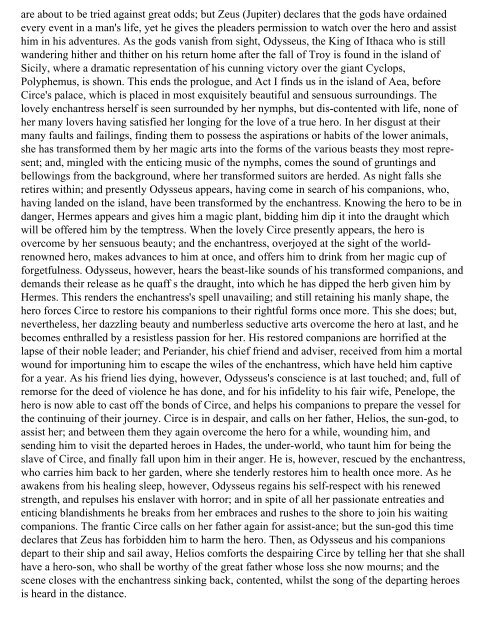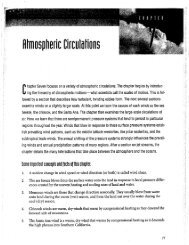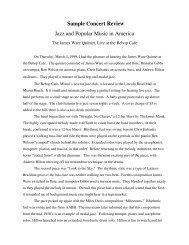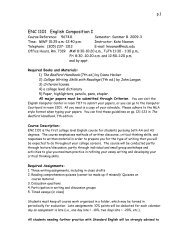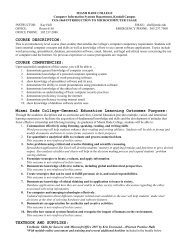Opera Plots I - MDC Faculty Home Pages
Opera Plots I - MDC Faculty Home Pages
Opera Plots I - MDC Faculty Home Pages
Create successful ePaper yourself
Turn your PDF publications into a flip-book with our unique Google optimized e-Paper software.
are about to be tried against great odds; but Zeus (Jupiter) declares that the gods have ordained<br />
every event in a man's life, yet he gives the pleaders permission to watch over the hero and assist<br />
him in his adventures. As the gods vanish from sight, Odysseus, the King of Ithaca who is still<br />
wandering hither and thither on his return home after the fall of Troy is found in the island of<br />
Sicily, where a dramatic representation of his cunning victory over the giant Cyclops,<br />
Polyphemus, is shown. This ends the prologue, and Act I finds us in the island of Aea, before<br />
Circe's palace, which is placed in most exquisitely beautiful and sensuous surroundings. The<br />
lovely enchantress herself is seen surrounded by her nymphs, but dis-contented with life, none of<br />
her many lovers having satisfied her longing for the love of a true hero. In her disgust at their<br />
many faults and failings, finding them to possess the aspirations or habits of the lower animals,<br />
she has transformed them by her magic arts into the forms of the various beasts they most represent;<br />
and, mingled with the enticing music of the nymphs, comes the sound of gruntings and<br />
bellowings from the background, where her transformed suitors are herded. As night falls she<br />
retires within; and presently Odysseus appears, having come in search of his companions, who,<br />
having landed on the island, have been transformed by the enchantress. Knowing the hero to be in<br />
danger, Hermes appears and gives him a magic plant, bidding him dip it into the draught which<br />
will be offered him by the temptress. When the lovely Circe presently appears, the hero is<br />
overcome by her sensuous beauty; and the enchantress, overjoyed at the sight of the worldrenowned<br />
hero, makes advances to him at once, and offers him to drink from her magic cup of<br />
forgetfulness. Odysseus, however, hears the beast-like sounds of his transformed companions, and<br />
demands their release as he quaff s the draught, into which he has dipped the herb given him by<br />
Hermes. This renders the enchantress's spell unavailing; and still retaining his manly shape, the<br />
hero forces Circe to restore his companions to their rightful forms once more. This she does; but,<br />
nevertheless, her dazzling beauty and numberless seductive arts overcome the hero at last, and he<br />
becomes enthralled by a resistless passion for her. His restored companions are horrified at the<br />
lapse of their noble leader; and Periander, his chief friend and adviser, received from him a mortal<br />
wound for importuning him to escape the wiles of the enchantress, which have held him captive<br />
for a year. As his friend lies dying, however, Odysseus's conscience is at last touched; and, full of<br />
remorse for the deed of violence he has done, and for his infidelity to his fair wife, Penelope, the<br />
hero is now able to cast off the bonds of Circe, and helps his companions to prepare the vessel for<br />
the continuing of their journey. Circe is in despair, and calls on her father, Helios, the sun-god, to<br />
assist her; and between them they again overcome the hero for a while, wounding him, and<br />
sending him to visit the departed heroes in Hades, the under-world, who taunt him for being the<br />
slave of Circe, and finally fall upon him in their anger. He is, however, rescued by the enchantress,<br />
who carries him back to her garden, where she tenderly restores him to health once more. As he<br />
awakens from his healing sleep, however, Odysseus regains his self-respect with his renewed<br />
strength, and repulses his enslaver with horror; and in spite of all her passionate entreaties and<br />
enticing blandishments he breaks from her embraces and rushes to the shore to join his waiting<br />
companions. The frantic Circe calls on her father again for assist-ance; but the sun-god this time<br />
declares that Zeus has forbidden him to harm the hero. Then, as Odysseus and his companions<br />
depart to their ship and sail away, Helios comforts the despairing Circe by telling her that she shall<br />
have a hero-son, who shall be worthy of the great father whose loss she now mourns; and the<br />
scene closes with the enchantress sinking back, contented, whilst the song of the departing heroes<br />
is heard in the distance.


